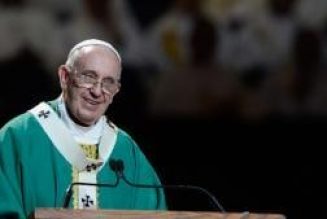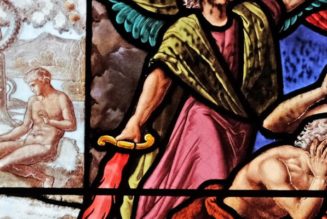By Dr. Jeff Mirus ( bio – articles – email ) | Feb 01, 2022
The great problem with Catholicism in the world today is not that so few people are willing to call themselves Catholic but that so many are willing to retain the Catholic name while eliminating the Catholic substance. Of course, we ought to be aware by now that this is the first trick in the book. Satan never begins with the last and greatest temptation, “All these I will give you, if you will fall down and worship me” (Mt 4:9). He always begins with the first and the easiest: “Command these stones to become loaves of bread” (Mt 4:3)—which is to say, “Reinterpret! It is easy to explain why good is really evil, and evil is really good.”
It probably is more than just tough luck that it requires a persistent and often uncomfortable cooperation with supernatural grace to do otherwise. It would be hard for any one of us to look in the mirror and not recall times when, through our own pride, selfishness or fear of disapproval, we have either downplayed our faith through silence or made it acceptable to wayward human desires by changing its meaning. This usually takes the form of identifying worldly values as “loving” and countercultural values as “hateful”. And this sounds just fine. All we need to do is ignore the results.
Take this problem and multiply it times ten to describe the lot of our intellectuals today, who tend, as the saying goes, to be too clever by half. The vast majority of those who claim to be part of the Catholic intelligentsia have reinterpreted (or reinvented) the Catholic faith to support the dominant worldly values. Everybody knows what these values are: They are the values you must express in order to be considered at the top of your field, and to keep your teaching position at virtually all secular colleges and universities—including a great many nominally Catholic ones.
Too clever by half, indeed: The first to fall into error, as a general rule, are those who make a profession out of being considered smarter than everybody else. You simply cannot be considered among the best and the brightest unless you actively defend and justify what “those who matter” want to hear. Those who matter are the people who decide on your career advancement and tenure, who control the major media, who report your accomplishments favorably in the wider community, who represent extensive financing by major foundations and corporations, and who do not cause the smooth waves of life to curl and crash by offering resistance to the prevailing winds.
Why pay attention, after all, to those who are too stupid to see which way the wind is blowing? That may initially be no more than embarrassing; but uncorrected, it is cause for censure.
Intelligentsia?
We see plenty of this in every walk of life, but especially in the corridors of wealth, influence and power. I had a friend in graduate school at Princeton, a refugee from Cuba, who quickly learned that while he could read the New York Times publicly, he had to reserve the more conservative New York Post for perusal in the bathroom stall. Of course if that is how you act when it comes to something as relatively inconsequential as career advancement, you’re pretty much doomed as a Christian unless you are willing to cooperate with grace. This, by the way, is as subtle and omni-present as cooperating with the dominant culture. You just have to reverse your yeses and noes. What, after all, would be the supernatural point of getting a job on the condition that you do not admit to anyone that you actually believe what Christ and the Church teach?
Make no mistake: Many nominally Catholic universities have this same atmosphere of diabolical unreality. The first place to go today if you do not want to experience freedom of thought and expression is a college or university where professors continually invent ways to grow in status by expanding wokeness into new areas of study. Of course, when Catholic orthodoxy was respectable (as it has been, briefly, here and there throughout history), I am sure some scholars were far better at elucidating it in words than in their lives. But now the key is to reinterpret reality always with some new “hermeneutic”—a theory of interpretation, any theory of interpretation, which replaces whatever guidance might be found in Divine Revelation, the Natural Law, and Common Sense.
Academia is largely populated by charlatans today; some of the more self-aware professors may well recognize they are playing a game, but the non-resistant do not have the moral seriousness to care.
The same trends are found in corporate life, the media, and of course politics. Worse, they trickle down to candidates for priesthood and religious life insofar as they are trained through secularized universities or (as is less often the case now than a generation ago) unreformed seminaries. On top of that, of course, our entire society seeks moral and theological “reinterpretations” to justify the sexual license over which it has quite literally gone mad, and this has also infected the priesthood and religious life, especially as some seek that life as a way to hide (or deploy) homosexual inclinations.
The realm of the world, the flesh and the devil is defended and advanced always in the same way: By enlisting the schools, the media, and the law to inculcate, publicize, and justify the worldview of those who control prosperity, position, and power. As a general rule, only those who are willing to decline in prosperity, position, and power will follow Christ honestly in thought, word and deed. This has often been true (and is often true now) even in the Church herself, but as cultures shift, the pressure points also change. Those who have not taken advantage—or refuse to take advantage—of Christ’s grace invariably trim the sails of faith to the prevailing winds of this world.
This does not mean that simply adopting counter-cultural positions ensures virtue and spiritual vitality. That can be just one more trick of the devil. To choose the counter-cultural simply because it is counter-cultural, that is, out of simple disaffection, rather obviously misses the point. But even if we cannot be always right, we should have at least the good Christian sense to avoid that attachment to the world which will make us always wrong.
A Jeremiad
On questions like this, it is instructive and refreshing to read Scripture with an open mind and an open heart. The Holy Spirit is at work in our reading of God’s Word, and if we deliberately choose to read it prayerfully—with any sort of plea to God in our hearts—we will almost always find something that speaks directly to us. It seems to me that this is demonstrably true of the Book of the Prophet Jeremiah when read sincerely by Catholics in our times, especially when we realize that the Church herself is the new Israel. Chapter 8 is particularly apt. I ask the reader to listen, with an open heart, to a few extracts.
First, on the now longstanding refusal of so many Catholics in the modern, affluent, secular West to turn back to God:
When men fall, do they not rise again? If one turns away, does he not return? Why then has this people turned away in perpetual backsliding? They hold fast to deceit; they refuse to return. I have paid attention and listened, but they have not spoken rightly; no man relents of his evil, saying, ‘What have I done?’ Everyone turns to his own course. [vv. 4-6]
Second, on so many leaders—in the clergy, in academia, even in politics—who falsely claim to be motivated by Catholic knowledge, wisdom and authority:
How can you say, “We are wise, and the law of the Lord is with us? But behold, the lying pen of the scribes has made it into a lie. The wise men shall be put to shame; they shall be dismayed and taken; behold, they have rejected the word of the Lord, so what wisdom is in them? …[F]rom the least to the greatest everyone is greedy for unjust gain; from prophet to priest, everyone deals falsely. They have healed the wound of my people lightly, saying, ‘Peace, peace,’ when there is no peace. Were they ashamed when they committed abomination? No, they were not at all ashamed; they did not know how to blush. [vv. 8-12]
Third and finally, on the astonishing truth that the Church herself, in her bishops, priests, religious, deacons and catechists, has not been able to offer effective help to so many of her own children who are confused and drifting far from God:
Is there no balm in Gilead? Is there no physician there? Why then has the health of the daughter of my people not been restored? [v. 22]
I sometimes wonder whether, broadly speaking as a culture, we believe that God can safely be mocked. How else can we explain the Catholic ecclesiastical and academic lassitude that we encounter, to some considerable extent, almost everywhere? Many preach and teach error more or less continually; many more offer no spiritual challenge to those who hear them; and a great many more, be they bishops or priests or deacons or religious or laity, are completely unwilling (in the words of St. Leopold Mandić) to “die of apostolic toil.”
What are so many Catholics thinking, including Catholic leaders? Does not the worldwide shutdown of the sacraments under COVID, along with the continuing sacramental restrictions on both clergy and laity, prove that those who bear the Catholic name have “reinterpreted” reality itself, to point away from God? What, indeed, are we ourselves thinking?
Are we not all called to have the same mind as St. Paul, when it comes to our relationship with the world, our relationship with the true and the good, our relationship with life itself? Yet here is what Paul wrote to the Philippians: “For to me to live is Christ, and to die is gain.”
And here are the words of Jesus Christ Himself, as quoted by St. Matthew, telling us He will brook no Catholic reinterpreters, no substitution of sterility for natural and spiritual fruitfulness, regardless of worldly success. All this will come to nothing in the end:
“Every tree that does not bear good fruit is cut down and thrown into the fire. Thus you will know them by their fruits. Not every one who says to me, ‘Lord, Lord,’ shall enter the kingdom of heaven, but he who does the will of my Father who is in heaven. On that day many will say to me, ‘Lord, Lord, did we not prophesy in your name, and cast out demons in your name, and do many mighty works in your name?’ And then will I declare to them, ‘I never knew you; depart from me, you evildoers’.”
Sound Off! CatholicCulture.org supporters weigh in.
All comments are moderated. To lighten our editing burden, only current donors are allowed to Sound Off. If you are a current donor, log in to see the comment form; otherwise please support our work, and Sound Off!

Join Our Telegram Group : Salvation & Prosperity










